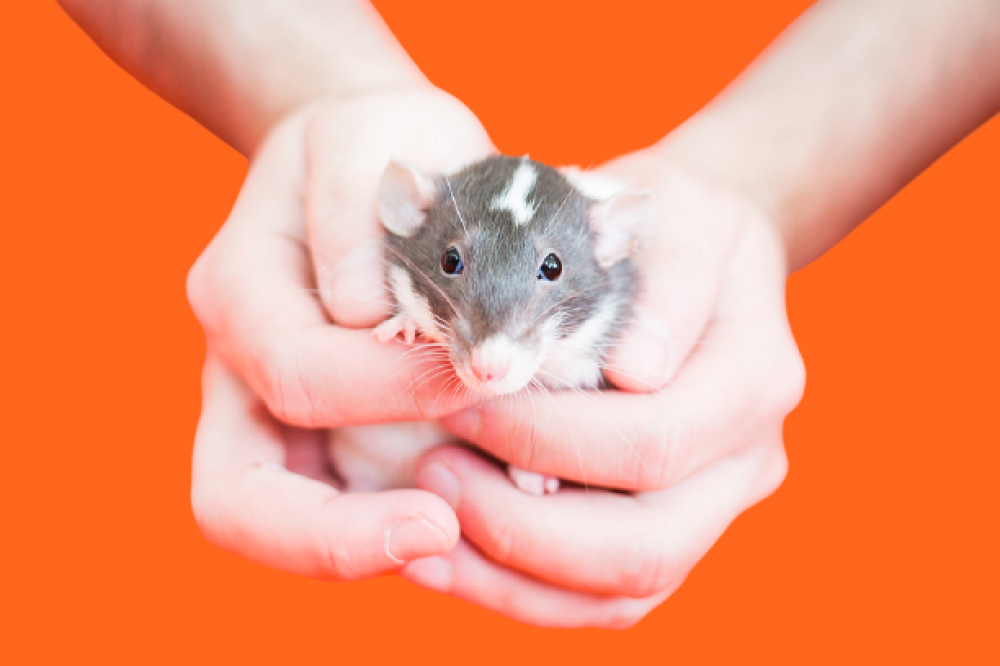Rat

Rats are smart, clean, and engaging animals. They live an average of two and a half years. Rats have poor eyesight but have great senses of hearing and smell. Rats are nocturnal; they prefer to sleep during the day and need attention and playtime in the evening. Rats are very social animals who require the companionship of their own species; it is unnatural for them to live alone. Rats enjoy grooming together, eating together, playing together, curling up to sleep together, and just being together. Rats also form deep bonds with their human caregivers.
Habitat Requirements
There is no such thing as a habitat that is too big! Your rats will be spending a majority of their time in their cage, so it should be as big as possible. The cage should provide a minimum of 2.5 cubic feet of space per rat.
- Cage bar spacing should be 1/2″ wide
- All wire levels should be covered to prevent damage to ratty feet
- Clean habitat at least once a week. Follow your nose, if the cage smells it is time to clean it!
- Rats like a crowded cage, fill your cage with interesting toys, hammocks, hides and dig boxes.
- We recommend Midwest Critter Nation cages (Not Ferret Nation) and Quality Cage Crafters’ Rat Cage
Bedding
We recommend Carefresh bedding or other similar unscented products. It is the safest and healthiest bedding choice for your rats. It is made from recycled wood pulp and is available at most pet stores. Never use pine, cedar, sawdust, corn cob bedding, chlorophyll bedding, or cat litter. Pine and Cedar are poisonous to all animals regardless of whether or not it is kiln dried. Fabric bedding may also be a good option depending on your choice of cage. Small Angels only recommends fleece fabric bedding when it is backed with an absorbent layer (such as U-Haul pads) and the cage also must contain a dig box to satisfy your rats’ natural digging instinct. Fabric bedding is a viable option with the above provisions taken, however the cage will need to be cleaned 1-3 times a week depending on the number of rats and if they are litter box trained.
Food
We recommend a high quality pellet food designed specifically for rats such as Oxbow Essentials Adult Rat Food or Science Selective Adult Rat Food. In addition to their dry food, rats should be given a daily fresh meal to add variety and interest to their diet. Rats Younger than 6 months old should be offered extra protein as a part of their daily fresh meal.
Hammocks
Rats LOVE hammocks and cubes and they are a must for every rat habitat. Hammocks can be found through many retailers, often marketed towards ferrets and sugar gliders. Many homemade hammocks are also available on Etsy and eBay.
Snacks
Rats require a widely varied diet that includes daily fresh vegetables, fruits, whole grains, and protein. The more natural the foods, the better. Some of the fresh foods rats enjoy include:
- asparagus
- avocado
- bell pepper
- broccoli
- carrots
- cauliflower
- celery
- corn
- cucumber
- eggs (scrambled or hard boiled)
- fresh herbs (basil, parsley,
mint, cilantro) - oatmeal
- okra
- pasta (cooked)
- peas
- pumpkin
- rice (cooked)
- spinach
- sprouts
- squash
- sweet potato (cooked)
- tomato
- zucchini
Exercise and Play
Rats are curious and smart, they can become depressed if bored. Rats enjoy tunnels, hammocks, bird toys, dig boxes, nest boxes, ladders, paper bags, ropes, chew toys, forage feeders, and more. Some rats will use an exercise wheel. If you choose to provide a wheel, it should be at least 12” in diameter (15” for large rats) and should have a solid running surface. We recommend the Wobust Wodent Wheel, the Giant Comfort Wheel, the Giant Silent Spinner, or the Chin Spin. Rats need time out of their habitat eery day for at least an hour. You can let them run around a rat-proofed room or set up a solid, tall play pen. Rats can easily get out of wire fence-type play pens.
Handling
Before you pick up your rat, make sure you have clean hands that do not smell like food. Make sure your rats are fully awake and aware of your presence. Scoop your rats up gently using both hands. Never pick your rats up by the tail, this is painful and can cause a serious injury called tail degloving.
Foods to avoid
Wild insects, iceberg lettuce, dried corn, raw/dry beans, potato eyes, green/raw potato, green parts of tomato, green bananas, rhubarb, onion, garlic, peanut butter (choking hazard), carbonated drinks, sugary/spicy/salty foods.
Signs of illness
The most common illnesses in rats are respiratory infections and tumors. Listen to your rats’ breathing and check their eyes and nose for red mucus discharge called porphyrin. Gently feel your rats body (especially the belly and under arms) for lumps and bumps. Rats are particularly good at hiding illnesses so changes in behavior or eating habits can be a sign of illness. If you notice anything unusual, take your rat to an exotics vet as soon as possible.
Download the rat care guide


